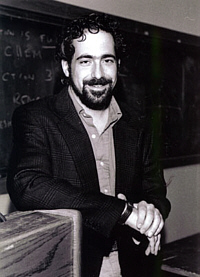
News Release
|
Office of News and Information Johns Hopkins University 3003 N. Charles Street, Suite 100 Baltimore, Maryland 21218-3843 Phone: (410) 516-7160 / Fax (410) 516-5251 |
September 24, 1999 FOR IMMEDIATE RELEASE MEDIA CONTACT: Glenn Small, glenn@jhu.edu |
Johns Hopkins Undergraduates to Record Oral Histories
 When Paul Kramer (pictured at right) teaches
his undergraduate students this fall about the civil
rights movement in Baltimore, he wants them to get a good
grounding in a number of
issues relating to that struggle.
When Paul Kramer (pictured at right) teaches
his undergraduate students this fall about the civil
rights movement in Baltimore, he wants them to get a good
grounding in a number of
issues relating to that struggle.
His students will read and discuss such things as racism, what makes a city, how segregation laws affected African Americans, the role black soldiers returning from World War II played in the struggle--and a host of other areas.
And then he wants them to hit the streets. With tape recorders.
"This is sort of the 'Blair Witch Project' part of the class," Kramer told his 55 students the first day of class. "Where we equip you and send you out to record interviews."
The course is called "The Baltimore Civil Rights History Project," and it was inspired by an article Kramer read in the Baltimore Sun about Baltimore civil rights leaders getting together to share memories. The story ended with those leaders lamenting the fact that no one had written their history, and the fear that much will be lost, if someone doesn't do it.
Kramer, a Johns Hopkins University graduate who earned his PhD at Princeton, decided he could help. With training in recording oral histories, and an interest in the civil rights movement, he began working up the course.
The key part of it is getting students out of the classroom and into the living rooms and kitchens of aging civil rights activists.
"I want students to get excited about history and I think this is a way to do it," Kramer said.
At the end of the course, Kramer hopes to be able to deposit his students' interview tapes--precious Baltimore oral history--at a historical society or library, such as the Maryland Room of the Enoch Pratt Free Library. Transcripts of the interviews might even be published in book form, he said.
To make the project work, Kramer applied for and received $3,000 in grant money to pay for tape recorders, tapes and transcribers. He also began compiling a list of people who had worked in the civil rights struggle in Baltimore.
Students will work in teams of two and each team will do at least two interviews, Kramer said. Before he sends them out, Kramer, who has experience recording oral histories, will train students on both the technical side and the reporting side, things such as how to hold the microphone for best sound and how to ask good questions.
Part of what Kramer did to prepare for the course was to gather names of Baltimoreans involved in the Civil Rights struggle, a database that now has roughly 150 names in it, Kramer said. A large number of names Kramer got from a list of those arrested in protests to desegregate the old Gwynn Oak Amusement Park in northwest Baltimore back in the 1960s.
While many of the names on the interviewee list will be recognizable leaders, Kramer said he doesn't want his students to stop there. He wants them also to interview just ordinary folks who worked at the grass-roots level.
Kramer is asking that anyone who knows veterans of the civil rights struggle in Baltimore contact him so that person can be added to the list. He may be reached at (410) 516-3326 or by e-mail at pakramer@jhu.edu.
|
Johns Hopkins University news releases can be found on the
World Wide Web at
http://www.jhu.edu/news_info/news/ Information on automatic e-mail delivery of science and medical news releases is available at the same address.
|
 Go to
Headlines@HopkinsHome Page
Go to
Headlines@HopkinsHome Page